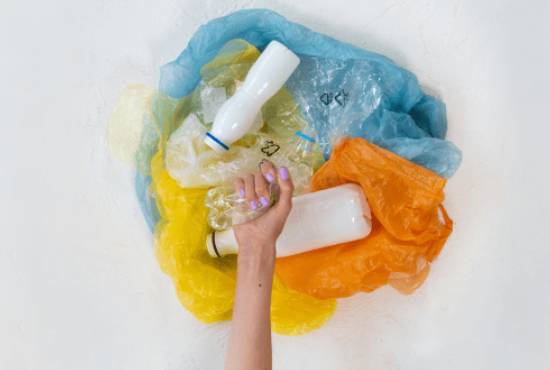However, if plastic wants to remain a reference in the packaging sector, it must face growing social and regulatory pressure: its environmental impact is now scrutinized, and it must evolve rapidly.
A market that is still dominant, but subject to strong constraints
Globally, the plastic packaging market is estimated to be worth USD 431 billion in 2023, and is expected to reach USD 733.6 billion by 2032, with an average annual growth of 6.16%.
In Europe, the sector is worth around USD 95 billion and is growing at a more moderate rate of around 2.9% per year until 2030. PET remains the most widely used polymer, while bioplastics are gaining ground as a result of environmental policies.
The continent has an average recycling rate of 41% for plastic packaging (2022), with strong disparities between countries: Germany, Belgium and Slovakia exceed 50%, while France remains around 25%, below the European average.
In France, the plastic packaging market represented 8.35 billion euros in 2023, or nearly a third of the overall turnover of the packaging sector. The flexible plastics segment continues to grow steadily (≈ 4%/year), but domestic polymer production fell by 8.8% in 2024, due to lower demand in the food and beverage sector.
Insufficient recycling performance
In France, only 22% to 26% of plastic packaging is recycled, far from the European target of 50% by 2025 and 55% by 2030. The new European PPWR (Packaging and Packaging Waste Regulation), which came into force in 2025, requires that all packaging be recyclable in an economically viable way by 2030, with minimum recycled content and enhanced reuse requirements.
The French AGEC law, for its part, provides for the gradual end of single-use plastic packaging by 2040 and encourages deposits and reuse. The "Plastic 2025–2030" plan presented by the government focuses on recycling and the incorporation of recycled plastics, but remains considered insufficient by NGOs and local authorities.
Today, a significant proportion of plastics placed on the market (estimated at 35%) are not recyclable, and the reuse rate remains very low (≈ 1% in 2023). Devices such as the deposit for glass — or even for plastic — are being studied to strengthen the circular model.
A need to reinvent itself
Plastic packaging manufacturers need to reinvent themselves: adopt recycling-friendly designs, incorporate recycled materials, develop advanced recycling channels, and stay ahead of regulations. The challenge is technological, organizational and strategic — but it is essential if the sector wants to remain credible in the face of the environmental challenges of the 21st century.

Showcase your plastic packaging solutions at ALLFORPACK EMBALLAGE PARIS
ALLFORPACK EMBALLAGE PARIS brings together key decision-makers from packaging user industries — CEOs, R&D managers, product managers, buyers and logistics directors. It’s the perfect opportunity to present your plastic packaging solutions and highlight your innovative, high-performance and customised offerings.
To maximise your visibility and facilitate meetings with qualified visitors, the show provides several effective tools and services:
- A redesigned online and print catalogue, now indexed by materials,
- A dedicated visitor trail focused on plastic solutions,
- Product and innovation highlights to communicate effectively about your offer,
- A matchmaking web app to identify prospects and plan meetings,
- A media kit to easily create promotional banners and announce your participation.
ALLFORPACK EMBALLAGE PARIS also offers a rich programme of conferences and special events, exploring the major challenges shaping the present and future of packaging.
A genuine platform for dialogue and inspiration, designed to imagine the future of packaging together.
Join the movement, showcase your expertise and expand your business opportunities.
See you in Paris from 24 to 26 November 2026!

